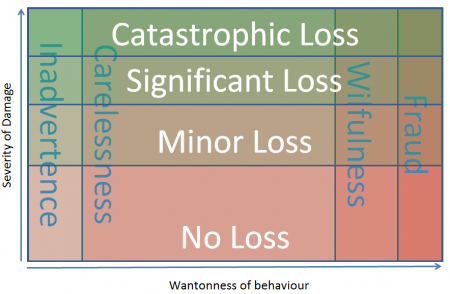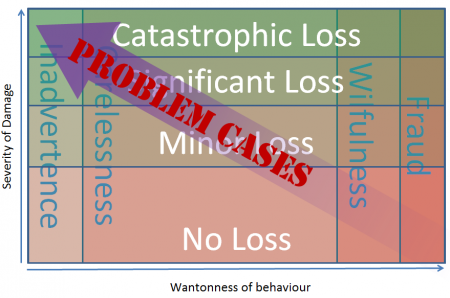Contractual negligence: Difference between revisions
Amwelladmin (talk | contribs) No edit summary |
Amwelladmin (talk | contribs) No edit summary |
||
| Line 5: | Line 5: | ||
But does it make sense to fritter away a contractual claim this way? | But does it make sense to fritter away a contractual claim this way? | ||
==={{tag|Fraud}}=== | ==={{tag|Fraud}}=== | ||
[[File:Contractual loss.PNG|450px|thumb|right|Damage against Wantonness. Mapped.]] | [[File:Contractual loss.PNG|450px|thumb|right|Damage against Wantonness. Mapped.]] | ||
You can't exclude contractual liability for fraud, so it's hardly a great concession to say so in a contract. | You can't exclude contractual liability for fraud: to do so is to step beyond the hermeneutic boundaries of the game one plays in entering a legal arrangement, so it's hardly a great concession to say so in a contract. A contract where, by its terms, one could behave fraudulently would be a rather arch affair. No points out of ten for remembering to exclude fraud, therefore. | ||
==={{tag|Wilful Default}}=== | |||
A heartily-bandied phrase which sounds like it ought to mean something. This fellow's best guess is something like a "deliberate refusal to perform one's obligations under a contract": not too far removed from fraud (it raises a presumption of fraudulence on the part of the actor in agreeing to the obligation in the first place) but in any weather a ''subset'' of the class of events "breaches of contract". Now breaches of contract, under the law of contract, entitle an wronged party to redress. That's what it means to be a breach. So it ought not cause your heart to leap to have your counterparty offering to be responsible for flagrant examples of this behaviour. This is hardly a mark of generosity. Indeed; you might wonder why ''less'' wilful "defaults" aren't captured, too - being, as they are, ''defaults''. | |||
For here's the point, lazengem: The point of a contractual ''obligation'' is to have some means of enforcing its performance - or, failing that - achieving compensation for its non-performance. | |||
So is that what negligence is meant to do? | |||
==={{tag|Negligence}}=== | |||
Maybe. But negligence is the standard of behavior expected in [[tort]], where, by definition, ''there is no contract between the parties'' to which one can look for guidance on how they were meant to behave. | |||
Now negligence is all good fun - reasonable men (and women), Clapham omnibuses, snails, ginger-beer, escaping domestic animals - but it evolved ''ad hoc'' to address a particular human dilemma - the plight of an unseen neighbour - that simply ''doesn't exist'' where you have a contract. Here you know damn well who your neighbour is, having spent six months hammering out a legal agreement with the blighter. So it seems all rather forlorn that one should fall back, weakly, on a standard devised by imaginative judges to look after the interests of contractless folk who found themselves struck by a punt being carelessly navigated the wrong way up a flooded avenue. | |||
[[File:Contractual loss2.PNG|450px|thumb|right|Damage against Wantonness. Mapped. Seriousness pointed out.]] Consider the handsome table to the right. This charts all conceivable breaches of contract. The easiest cases are in the bottom right: not much loss, but the defaulting party has been gratuitous in its behavior and however paltry the claim, has no leg to stand on. | |||
The hard cases are in the top left: here there has been little culpable misbehaviour as such (but note our condition to entry: the terms of the contract have been transgressed), but a significant loss as come about nonetheless. | |||
Are these the examples an exclusion from liability for negligence is meant to cover? Surely not: a contractual obligation is a contractual obligation. Doing things this way betrays laziness or a lack of legal acuity from your counsel. It is not that you wish to apply an exclusion from contractual liability if a party hasn't been negligent - what you mean to say is that your counterparty ''is only obliged in the first place to exercise a certain standard of care''. If you craft the contract that way, there's no need to carve out liability for non-negligent behaviour, because that behaviour wouldn't breach the contract in the first place. | |||
====But isn't this an easier catch-all?==== | ====But isn't this an easier catch-all?==== | ||
"But", yon lazy attorney wails, "adopting | "But", yon lazy attorney wails, "adopting that approach means we have to write in a standard of care to every obligation under the contract. As a plain English denizen you can't really want that? Surely it's easier to carve it out!" | ||
But | But a contract is meant to stipulate what you are expected to do. For some obligations, a "reasonable standard of care" rider is not appropriate. The payment of money, for example. | ||
{{Box|Bill borrows Ben's car. He agrees to return it to Ben on Thursday at 3pm. At the appointed time Bill presents himself to Ben, but announces that he has just been mugged, and the car has been stolen. His mugger was quite unexpected, applied overwhelming force, and immediately drove the car into a wall and wrote it off. Through no fault of his own, Bill is unable to perform his obligation. Should he be able to rely on a carve out from liability because he has not been negligent?}} | {{Box|Bill borrows Ben's car. He agrees to return it to Ben on Thursday at 3pm. At the appointed time Bill presents himself to Ben, but announces that he has just been mugged, and the car has been stolen. His mugger was quite unexpected, applied overwhelming force, and immediately drove the car into a wall and wrote it off. Through no fault of his own, Bill is unable to perform his obligation. Should he be able to rely on a carve out from liability because he has not been negligent?}} | ||
Revision as of 18:14, 29 April 2016
An attorney eyes you wistfully and slides a draft across the table to you.
- Party A shall not be liable for any losses, howsoever caused, unless they arise directly from its own negligence, fraud or wilful default.
What should one make of this? At a glance it seems perfectly reasonable. To be sure, it is time-honoured boilerplate, thrown into contracts to close them out like chump change tossed into the bill platter at the end of an agreeable meal with passable company of whom one has now had enough.
But does it make sense to fritter away a contractual claim this way?
Fraud
You can't exclude contractual liability for fraud: to do so is to step beyond the hermeneutic boundaries of the game one plays in entering a legal arrangement, so it's hardly a great concession to say so in a contract. A contract where, by its terms, one could behave fraudulently would be a rather arch affair. No points out of ten for remembering to exclude fraud, therefore.
Wilful Default
A heartily-bandied phrase which sounds like it ought to mean something. This fellow's best guess is something like a "deliberate refusal to perform one's obligations under a contract": not too far removed from fraud (it raises a presumption of fraudulence on the part of the actor in agreeing to the obligation in the first place) but in any weather a subset of the class of events "breaches of contract". Now breaches of contract, under the law of contract, entitle an wronged party to redress. That's what it means to be a breach. So it ought not cause your heart to leap to have your counterparty offering to be responsible for flagrant examples of this behaviour. This is hardly a mark of generosity. Indeed; you might wonder why less wilful "defaults" aren't captured, too - being, as they are, defaults.
For here's the point, lazengem: The point of a contractual obligation is to have some means of enforcing its performance - or, failing that - achieving compensation for its non-performance.
So is that what negligence is meant to do?
Negligence
Maybe. But negligence is the standard of behavior expected in tort, where, by definition, there is no contract between the parties to which one can look for guidance on how they were meant to behave.
Now negligence is all good fun - reasonable men (and women), Clapham omnibuses, snails, ginger-beer, escaping domestic animals - but it evolved ad hoc to address a particular human dilemma - the plight of an unseen neighbour - that simply doesn't exist where you have a contract. Here you know damn well who your neighbour is, having spent six months hammering out a legal agreement with the blighter. So it seems all rather forlorn that one should fall back, weakly, on a standard devised by imaginative judges to look after the interests of contractless folk who found themselves struck by a punt being carelessly navigated the wrong way up a flooded avenue.
Consider the handsome table to the right. This charts all conceivable breaches of contract. The easiest cases are in the bottom right: not much loss, but the defaulting party has been gratuitous in its behavior and however paltry the claim, has no leg to stand on.
The hard cases are in the top left: here there has been little culpable misbehaviour as such (but note our condition to entry: the terms of the contract have been transgressed), but a significant loss as come about nonetheless.
Are these the examples an exclusion from liability for negligence is meant to cover? Surely not: a contractual obligation is a contractual obligation. Doing things this way betrays laziness or a lack of legal acuity from your counsel. It is not that you wish to apply an exclusion from contractual liability if a party hasn't been negligent - what you mean to say is that your counterparty is only obliged in the first place to exercise a certain standard of care. If you craft the contract that way, there's no need to carve out liability for non-negligent behaviour, because that behaviour wouldn't breach the contract in the first place.
But isn't this an easier catch-all?
"But", yon lazy attorney wails, "adopting that approach means we have to write in a standard of care to every obligation under the contract. As a plain English denizen you can't really want that? Surely it's easier to carve it out!"
But a contract is meant to stipulate what you are expected to do. For some obligations, a "reasonable standard of care" rider is not appropriate. The payment of money, for example.
- Bill borrows Ben's car. He agrees to return it to Ben on Thursday at 3pm. At the appointed time Bill presents himself to Ben, but announces that he has just been mugged, and the car has been stolen. His mugger was quite unexpected, applied overwhelming force, and immediately drove the car into a wall and wrote it off. Through no fault of his own, Bill is unable to perform his obligation. Should he be able to rely on a carve out from liability because he has not been negligent?

